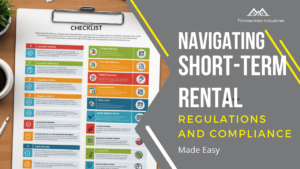Exercitation ullamco laboris nis aliquip sed conseqrure dolorn repreh deris ptate velit ecepteur duis.
Navigating Short-Term Rental Regulations and Compliance
-
Vestio Capital > Education > Investing in Vacation Rentals > Navigating Short-Term Rental Regulations and Compliance

The short-term rental market has exploded in recent years, driven by platforms like Airbnb and Vrbo. While this presents exciting opportunities for property owners, it also comes with a complex web of regulations and compliance requirements. Navigating these rules is crucial for avoiding legal issues and ensuring a successful rental operation. This article provides an overview of the legal landscape for short-term rentals and offers practical tips for staying compliant with local regulations, tax obligations, and licensing requirements.
 1. Understanding Local Regulations
1. Understanding Local Regulations
Short-term rental regulations vary significantly from one location to another. Some cities have stringent rules regarding the operation of rental properties, while others are more lenient. It is essential to familiarize yourself with the specific regulations in your area, which may include limits on the number of rental days, zoning restrictions, or requirements for property safety and maintenance.
Tips for Compliance:
- Research Local Laws: Check with your local government or zoning office to understand the regulations that apply to your rental property.
- Join Local Associations: Many cities have local short-term rental associations that provide resources and updates on regulatory changes.
- Consult a Legal Expert: Consider hiring a lawyer who specializes in real estate or short-term rental laws to ensure you fully understand and comply with local regulations.
2. Licensing Requirements
Many jurisdictions require short-term rental operators to obtain a specific license or permit before listing their property. This licensing process often includes submitting an application, paying fees, and meeting certain health and safety standards.
Tips for Compliance:
- Apply for the Necessary Licenses: Ensure you have obtained all required licenses or permits before starting your rental operation.
- Maintain Good Records: Keep detailed records of your license status and renewal dates to avoid lapses in compliance.
- Stay Updated: Monitor changes in licensing requirements and ensure you make any necessary updates to your application or property.
3. Tax Obligations
Short-term rental income is subject to various tax obligations, including income tax and potentially occupancy or transient taxes. Understanding your tax responsibilities is crucial for avoiding penalties and managing your rental income effectively.
Tips for Compliance:
- Report Rental Income: Accurately report all rental income on your tax returns. Use accounting software or hire a tax professional to help with accurate reporting.
- Collect and Remit Taxes: In many areas, you are required to collect and remit occupancy or transient taxes from guests. Ensure you understand the rates and procedures for collecting these taxes.
- Keep Financial Records: Maintain thorough records of your rental income and expenses to simplify tax reporting and ensure you are meeting your obligations.
4. Insurance and Liability
Proper insurance coverage is essential for protecting yourself and your property. Many standard homeowner’s insurance policies do not cover short-term rental activities, so you may need to purchase additional coverage or a specific short-term rental policy.
Tips for Compliance:
- Review Your Insurance Policy: Check with your insurance provider to ensure your policy covers short-term rental activities.
- Consider Specialized Coverage: Look into specialized insurance products designed for short-term rental properties to ensure you are adequately protected.
- Address Liability Concerns: Be aware of potential liability issues and take steps to minimize risks, such as implementing safety measures and providing clear guest instructions.
5. Safety and Health Standards
Ensuring that your property meets safety and health standards is not only a regulatory requirement but also a key factor in guest satisfaction. Many jurisdictions have specific safety requirements for short-term rentals, including smoke detectors, carbon monoxide detectors, and fire extinguishers.
Tips for Compliance:
- Conduct Regular Inspections: Regularly inspect your property to ensure it meets all safety and health standards.
- Provide Safety Equipment: Equip your rental with necessary safety features, such as smoke detectors, first aid kits, and clear emergency instructions.
- Follow Up on Complaints: Address any safety or health complaints from guests promptly to maintain compliance and ensure a positive guest experience.
6. Addressing Complaints and Disputes
Handling complaints and disputes effectively is crucial for maintaining a positive reputation and staying compliant with regulations. Ensure you have a clear process for managing guest issues and resolving conflicts.
Tips for Compliance:
- Establish Clear Policies: Create and communicate clear policies regarding cancellations, refunds, and guest behavior.
- Respond Promptly: Address guest complaints and disputes in a timely and professional manner.
- Document Issues: Keep records of all guest communications and resolutions to protect yourself and ensure compliance.
Conclusion
Navigating the regulatory landscape for Holiday homes requires careful attention to local laws, licensing requirements, tax obligations, and safety standards. By staying informed and proactive, you can ensure compliance and run a successful rental operation. Understanding and adhering to these regulations not only helps you avoid legal issues but also enhances your guests’ experience and contributes to the overall success of your rental business.

